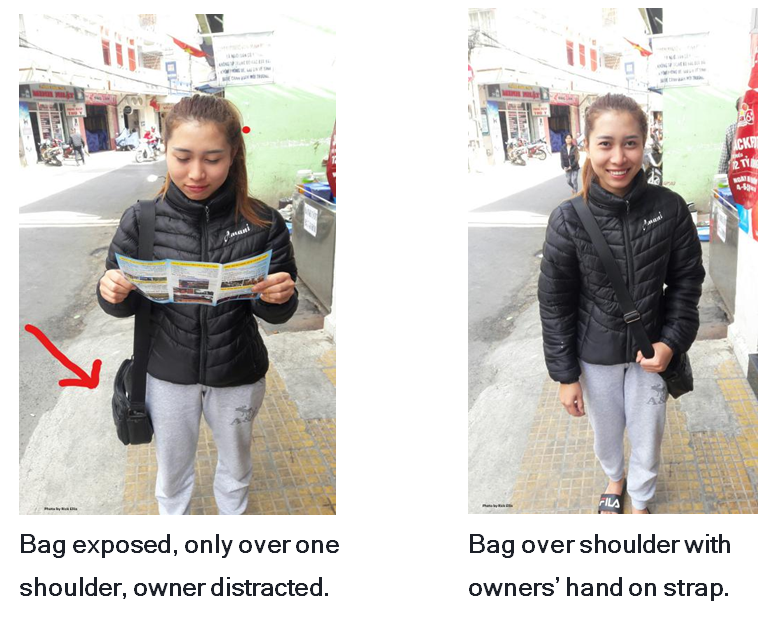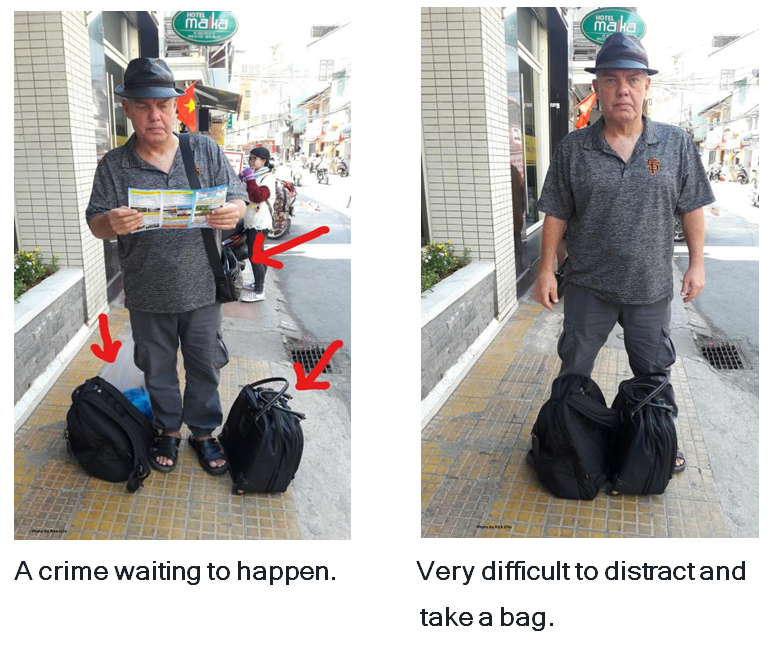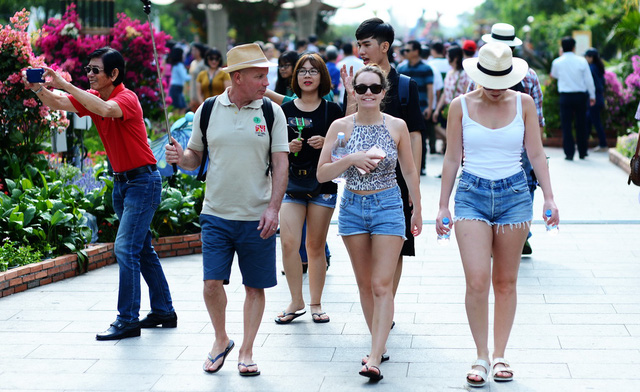Other tips to minimize or eliminate risks for tourists in Vietnam, following the first eight suggestions in the previous story.
>> Keeping your belongings safe when travelling in Vietnam (Part 1)
9. Stash cash in your room:
The best place to stash cash is in your hotel room.
I’ve made somewhere between 7 and 800 hotel visits in my lifetime and only once had travelers' checks stolen - never lost one dollar in cash on any trip.
Optimize between the type of hotel you can afford, features you need, and the amount of security offered. A better class hotel doesn’t always ensure better security, but if you take a super cheap room in a seedy hotel, you’re adding to the risk of theft. In that case, you turn your security up a notch and carry less cash and visit ATMs more often.
Many hotels offer in-room safes these days, but don’t forget the combination or it will cost you a lot to have it broken into.
On short stays of one or two nights leave the Do Not Disturb sign on your door all the time and tell the room attendant that you’re jet-lagged and probably won’t need service. Less visits to the room means less risk.
Count your cash before you go out of your room and check it when you return. If money is missing you can help by identifying a precise time frame during which your cash was taken.
Hotels highly value reviews published online so be sure to sift through the feedback before booking. If a hotel has a reputation for theft you’ll find out very quickly looking at guest reviews.
If you feel uneasy about a place and no safe is available, seek out a good hiding spot in your room - in the folds of the curtains, cupboards, behind pictures hanging on the wall, etc. You can also lock one pocket or side of your bag or backpack to reduce the temptation for dishonest staff members.
Either way, the chance of theft from your room is much less than on the street, so store extra cash in your room and carry less when outside.
10. Study the fees your financial institution charges
Understand the fees involved when making international ATM and credit card cash withdrawals and credit card transactions. My little local bank takes only one percent for each transaction, so I’m able to walk around with minimal cash in my pocket knowing that I can withdraw cheaply whenever I want.
Many big banks charge an arm and a leg for overseas cash withdrawals, both by percentage of the amount withdrawn plus a fee per transaction. These charges add up so subconsciously you will take more cash than you need just to avoid that hefty transaction fee, and end up walking around with too much money. That’s a risk that’s better avoided.
Shop around before you travel, competition between financial institutions is fierce, so you can probably find a better deal on overseas cash withdrawals.
11. Snatchings galore
More and more drive-by snatchings are occurring in countries where motorbikes are the main mode of transportation and Vietnam is right at the top for risk because there are simply so many roads full of motorbikes.
Switch the shoulder that you’re carrying your bag on so that the bag is always facing the buildings as you walk along the sidewalk and never exposed to passing traffic.
Walk facing oncoming traffic - that means you’re looking at the traffic as it comes along the street toward you. Not only is that the safest way to walk, it’s also the most secure because a snatcher cannot sneak up on you from behind unless they’re up on the sidewalk driving the wrong way.

In the above two photos it’s easy to see which situation a couple of snatchers cruising the streets on a motorbike will choose as their victim.
And that’s exactly what snatchers do: They cruise around looking for the easiest victim to rob. Make it difficult for them and they’ll pass you by.
When you cross the street, switch shoulders again so that your bag is not exposed. This may seem hard to do but after a while it becomes instinct.
Smart phones have become a huge target for theft because they’re worth so much money these days. Carry your phone in a shoulder bag or purse and only take it out when you need it. Keep the bag looped over one shoulder and across your lap rather than just carrying it loosely over one shoulder as shown in the photo on the left side above.
You can also carry your phone in a zippered or buttoned pocket of your pants or jacket but phones get bigger and heavier all the time, so that’s not always an option. Don’t just put it in a traditional open pants pocket, that’s the easiest way to lose a phone, especially on public transportation or in taxis.
Never take the shoulder bag off when out and about, rather just let the bag rest on your lap when seated while the strap remains looped over your shoulder. If you’re tired of the weight on your shoulder, let the strap slip down around your waist with the bag resting on your lap.
That approach makes it natural to take your phone out, use it, and immediately return it to the bag when finished because the bag is right in front of you.
People leave their phones out on tables all the time and they get stolen in a second, it’s so easy to do. A distraction from one side together with a waiting partner on the other side and your valuable phone and all that priceless personal information is gone for good.
Check out this short clip from China showing several ways to distract and rob including a couple of slick tricks to steal smart phones.
12. Don’t carry your passport around
Your passport may seem less important than cash and ATM or Credit cards, but it’s actually the opposite.
If your passport is lost or stolen you are stuck overseas with no way out until you replace it. That can take a few days, even weeks if the Embassy or Consulate you need is in another faraway city.
Add up the cost of replacing a passport including travel, accommodation (which is pretty difficult to rent without a passport!), out-of-pocket and living expenses and it can be very expensive.
It’s correct to say that in most countries the law states that people carry identification with them at all times, but that pertains mostly to local citizens, not tourists. Local authorities do not expect foreign visitors to carry their passports on them all the time.
Instead, carry “cheaper” ID such as drivers’ license, membership and discount cards, and a copy of your passport.
If needed you can always return to your accommodation and get your passport, but if you carry it around outside and it gets lost or stolen, it’s gone, and will be a lot of hassle, money, and work to replace.
13. Keep your belongings in direct sight when outside
When in transit keep the number of items you carry limited at two pieces - one for each hand. Struggling to keep hold of more than that and you’re introducing risk that you don’t need to take. More stuff you have, harder it is to keep an eye on it, and easier it is to lose track of something.
Best is to keep your hands on your bags, but if you do need to put them down, put them directly IN FRONT OF YOURSELF on the ground, not to the side or behind you. Keep them in plain sight all the time and move your items every time you move so they’re always in front of you.
The situation below could happen to anyone arriving in a strange city for the first time: Out comes the map or smartphone, then automatically the belongings on the ground take second priority, so it’s easy for a thief to distract and steal or snatch while driving by.
Note there are four separate items that must be cared for in the photo on the left side: two black bags, a blue plastic bag, and the black shoulder bag. Two items only is ideal - one for each hand.
In the right hand photo below the extra two pieces (blue plastic bag and shoulder bag) have been packed inside the two main black bags for safekeeping. The bags are even touching the owners’ feet making it that much more difficult to distract him and take one or both.

|
Here is a recap of the 13 point list so you can go forward and spend your time HAVING FUN instead of fixing emergencies: 1. Always use an ATM inside a bank branch and use it during bank opening hours only. 2. Back up your PIN codes on the internet so you can access them from anywhere with an internet connection should you forget them. 3. Don’t take your ATM card with you when you go out. Use it, then store it. 4. Have a friend back home ready to relay a new card to you overseas in case an emergency arises. 5. Be sure to have at least one back-up way to get cash from an ATM - a second bank card or a credit card set up for cash withdrawals. 6. Back-up the back-ups by buying a prepaid ATM card or similar while abroad. Always store cards in separate bags/places and not all together in a wallet or similar. 7. Don’t keep large current account bank balances. 8. Keep online photos of both sides of your ATM and credit cards. 9. Leave all identification and ATM/Credit cards and minimal cash in your room - it’s less risk than carrying with you on the street. 10. Understand the fees your bank charges for overseas ATM and Credit Card transactions in advance of your trip so you can carry the right amount of cash without having to visit the ATM too often and pay transaction fees. 11. Wear your shoulder bag and backpack firmly looped over your shoulder away from the street so they can’t be easily snatched from a motorbike. 12. Never carry your passport with you while walking around at your destination. Check in, leave it with the front desk or in your bag. Take a photocopy of it just in case. Carry a less critical piece of ID such as your drivers’ license. 13. Keep your belongings directly in your line of sight at all times when outside, not beside you or behind you. |


















































